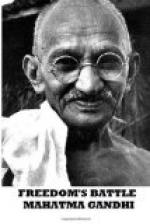Nor is Fiji the only place where the spirit of lawlessness among the powerful has come to the surface. Indians of (the late) German East Africa find themselves in a worse position than heretofore. They state that even their property is not safe. They have to pay all kinds of dues on passports. They are hampered in their trade. They are not able even to send money orders.
In British East Africa the cloud is perhaps the thickest. The European settlers there are doing their utmost to deprive the Indian settlers of practically every right they have hitherto possessed. An attempt is being made to compass their ruin both by legislative enactment and administrative action.
In South Africa every Indian who has anything to do with that part of the British Dominions is watching with bated breath the progress of commission that is now sitting.
The Government of India have no easy job in protecting the interests of Indian settlers in these various parts of His Majesty’s dominions. They will be able to do so only by following the firmest and the most consistent policy. Justice is admittedly on the side of the Indian settlers. But they are the weak party. A strong agitation in India followed by strong action by the Government of India can alone save the situation.
INDIANS OVERSEAS
The meeting held at the Excelsior Theatre in Bombay to pass resolutions regarding East Africa and Fiji, and presided over by Sir Narayan Chandavarkar, was an impressive gathering. The Theatre was filled to overflowing. Mr. Andrews’ speech made clear what is needed. Both the political and the civil rights of Indians of East Africa are at stake. Mr. Anantani, himself an East African settler, showed in a forceful speech that the Indians were the pioneer settlers. An Indian sailor named Kano directed the celebrated Vasco De Gama to India. He added amid applause that Stanley’s expedition for the search and relief of Dr. Livingstone was also fitted out by Indians. Indian workmen had built the Uganda Railway at much peril to their lives. An Indian contractor had taken the contract. Indian artisans had supplied the skill. And now their countrymen were in danger of being debarred from its use.




